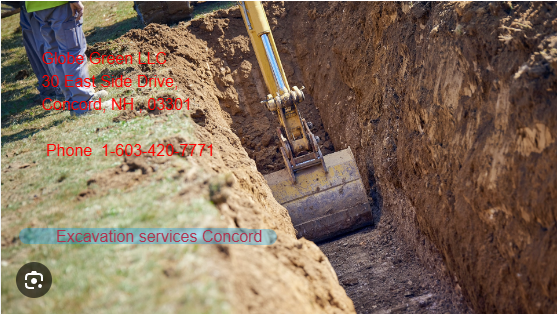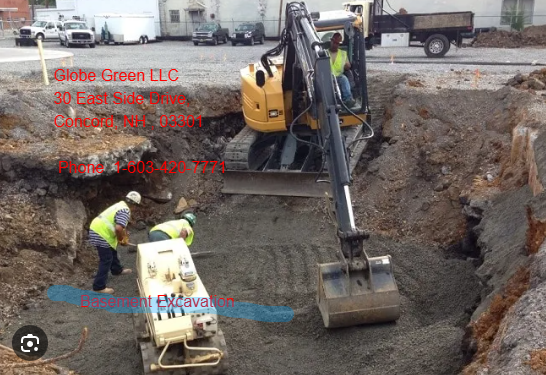Introduction
Building a structure is akin to crafting a masterpiece; it requires meticulous planning, skill, and precision. But what often gets overlooked in the excitement of construction is the critical phase of site preparation. When done correctly, effective site prep can serve as the bedrock for your project—literally and figuratively—ensuring that future structural issues are minimized or completely avoided.
In this article, we will delve deep into the myriad facets of site preparation and explore how it lays the groundwork for successful construction projects. Whether you're a homeowner looking to build your dream house or a contractor searching for reliable excavation companies near me, understanding the importance of site prep is crucial. Let’s embark on this adventurous journey together!
What Is Site Preparation?
Defining Site Preparation in Construction
Site preparation refers to the process undertaken before construction begins, which involves clearing, grading, and excavating the land to ensure it's ready for building. This step is essential in laying down a solid foundation as it addresses various factors such as soil stability, drainage systems, and environmental considerations.
The Importance of Site Preparation
Site prep isn’t just about moving dirt around—it's about creating a secure base for whatever is about to rise from it. It sets the stage for proper drainage, prevents erosion, and can even enhance aesthetic appeal through landscaping.
How Effective Site Prep Can Prevent Future Structural Issues
Imagine investing thousands of dollars into constructing your dream home only to find cracks in your walls or water pooling in your basement months later! This scenario could be avoided through effective site preparation.
Effective site prep involves several steps:
Soil Testing: Before getting started with excavation contractors Concord NH like Globe Green LLC, it's vital to understand what type of soil you're dealing with. Different soils have various weight-bearing capacities; knowing what you have ensures that you can plan accordingly.
Grading: This step helps direct water away from your foundation. If water pools around your structure, it can lead to significant structural issues over time.

Excavation: Proper basement excavation is crucial if you're planning for an underground level in your building. Poor excavation practices can lead to settling or shifting structures down the line.
Drainage Solutions: Incorporating drainage solutions during site prep will help channel rainwater away from foundations and prevent moisture accumulation that could encourage mold growth or damage.
Retaining Walls: If you're working on sloped land, retaining walls can provide necessary support and prevent erosion.
By ensuring these elements are carefully addressed during the initial stages of construction, you effectively safeguard against costly repairs and renovations later on.
Common Structural Issues Caused by Poor Site Preparation
Foundation Settling
One of the most common problems resulting from inadequate site prep is foundation settling. This occurs when soil beneath a foundation shifts due to improper grading or insufficient compaction before building starts.
Water Damage
Poor drainage solutions mean water accumulates around structures, leading to potential flooding or leaks within basements—especially critical if you've embarked on basement excavation without proper planning.
Cracking Walls
As soil shifts or settles unevenly after https://globegreenllc.com/contact/ construction begins (often due to poor site prep), walls may crack under pressure; neglecting this issue only exacerbates structural integrity problems over time.
Erosion Risks
Without implementing erosion control measures during site prep such as silt fences or sediment basins, precious topsoil can wash away during heavy rains—further destabilizing foundations and leading to additional repair costs down the road.
Steps Involved in Effective Site Prep
1. Initial Assessment of Land Quality
Before any digging begins, it's vital to conduct thorough assessments of land quality through soil testing services offered by excavation contractors Concord NH like Globe Green LLC. Understanding soil composition helps determine load-bearing capabilities and informs decisions regarding foundations needed for different types of buildings.

2. Clearing Debris and Vegetation
Once assessed properly, debris removal comes next—getting rid of any existing trees, roots, rocks—or anything else that might obstruct future building efforts! Clearing vegetation also helps reduce risks associated with pests who consider overgrown areas prime real estate!
3. Grading for Proper Drainage
Next up is grading! Properly sloping surfaces away from structures ensures effective water drainage—which should always be a top priority! A well-graded landscape not only protects foundations but also enhances curb appeal!
4. Excavation Techniques Matter!
When planning basement excavation projects specifically; utilizing advanced techniques such as trenching provides more accurate outcomes than traditional methods while minimizing risks associated with cave-ins!
Table 1: Comparison Between Various Excavation Techniques
| Technique | Pros | Cons | |------------------|---------------------------------------|----------------------------------------| | Traditional | Simple & straightforward | Higher risk for cave-ins | | Trenching | More precise & controlled | Requires specialized equipment | | Auger Boring | Minimizes disruption | Limited by soil type |
Choosing The Right Excavation Company For Your Project
Finding trustworthy excavation companies near me becomes essential when embarking on projects requiring expertise—from large commercial buildings down through residential homes!
Researching Local Contractors
Start by researching local contractors who specialize in excavation services; look out for customer reviews online alongside their past project portfolios—that'll give insight into their work quality!
Why Choose Globe Green LLC?
If you're residing in Concord NH area looking out for “best excavation company in Concord NH,” consider Globe Green LLC! With years of experience under their belt—they excel at providing tailored solutions specific needs while adhering strictly industry standards ensuring peace-of-mind throughout every stage project execution!
Quote: "Choosing quality over price often saves money long-term!"
Understanding Soil Types Impacting Site Prep
Different soil types behave differently under pressure; thus recognizing these characteristics aids during both assessment phases before commencing work:
- Clay: Expands when wet & shrinks when dry—leading potential structural issues unless adequately managed! Sandy Soil: Drains quickly but may lack cohesion undermining overall stability unless reinforced properly! Loam: The ideal balance between clay/sand—offering high fertility while supporting strong foundations!
Table 2: Properties Of Different Soil Types
| Soil Type | Characteristics | Best Use Cases | |------------------|-----------------------------------------------|------------------------------------| | Clay | High plasticity & compressibility | Foundations needing extra support | | Sandy | Well-drained yet loose | Landscaping & garden beds | | Loamy | Balanced mix offering good stability | Most general construction needs |
The Role Of Retaining Walls In Site Prep
When tackling sloped properties—it’s imperative not only enhance aesthetics but also provide stabilization through retaining walls designed according specific project requirements.
Benefits Of Building Retaining Walls
1) They help control erosion caused by heavy rains. 2) Retain soil preventing landslides protecting adjacent structures! 3) Enhance property value offering attractive features complementing design styles!
FAQs About Effective Site Preparation
1) What is the primary goal of effective site preparation?
The primary goal is ensuring a stable foundation that minimizes future structural issues related directly back onto poor practices taken beforehand!
2) How do I know if my land needs extensive grading?
If surface water accumulates after rainstorms causing puddles around property lines—it’s likely time address grading concerns promptly!
3) Are there permits required before beginning site work?
Yes! Always check local regulations concerning permits necessary prior commencement especially major earth-moving activities involving large machinery usage!
4) How does weather impact excavation timelines?
Heavy rain can delay excavations significantly due flooding risks along with unpredictable ground conditions affecting progress made on-site overall timeline adjustments accordingly are necessary here too!
5) Can I perform my own site prep?
While DIY might seem appealing—it’s best left professionals who possess expertise required handling complexities involved safeguarding investments made against potential pitfalls down road ahead so hiring qualified contractors remains wise choice all-around!
6) What should I look for when hiring an excavation contractor?
Look out for experience level within industry accreditations received previous client testimonials helping gauge overall reliability performance metrics observed previously associated reputation established locally within community served actively!
Conclusion
In conclusion, effective site preparation plays an instrumental role in preventing future structural issues that could lead to costly repairs down the line. From understanding soil types to selecting reputable excavation companies near me like Globe Green LLC in Concord NH—the groundwork you lay today will determine how well your structure stands tomorrow.
So take those first steps wisely! Don’t skimp on getting professional help; proper investment now means peace-of-mind later allowing you enjoy spaces created without worry looming overhead about possible defects arising unexpectedly lurking beneath surface unseen until it's too late!